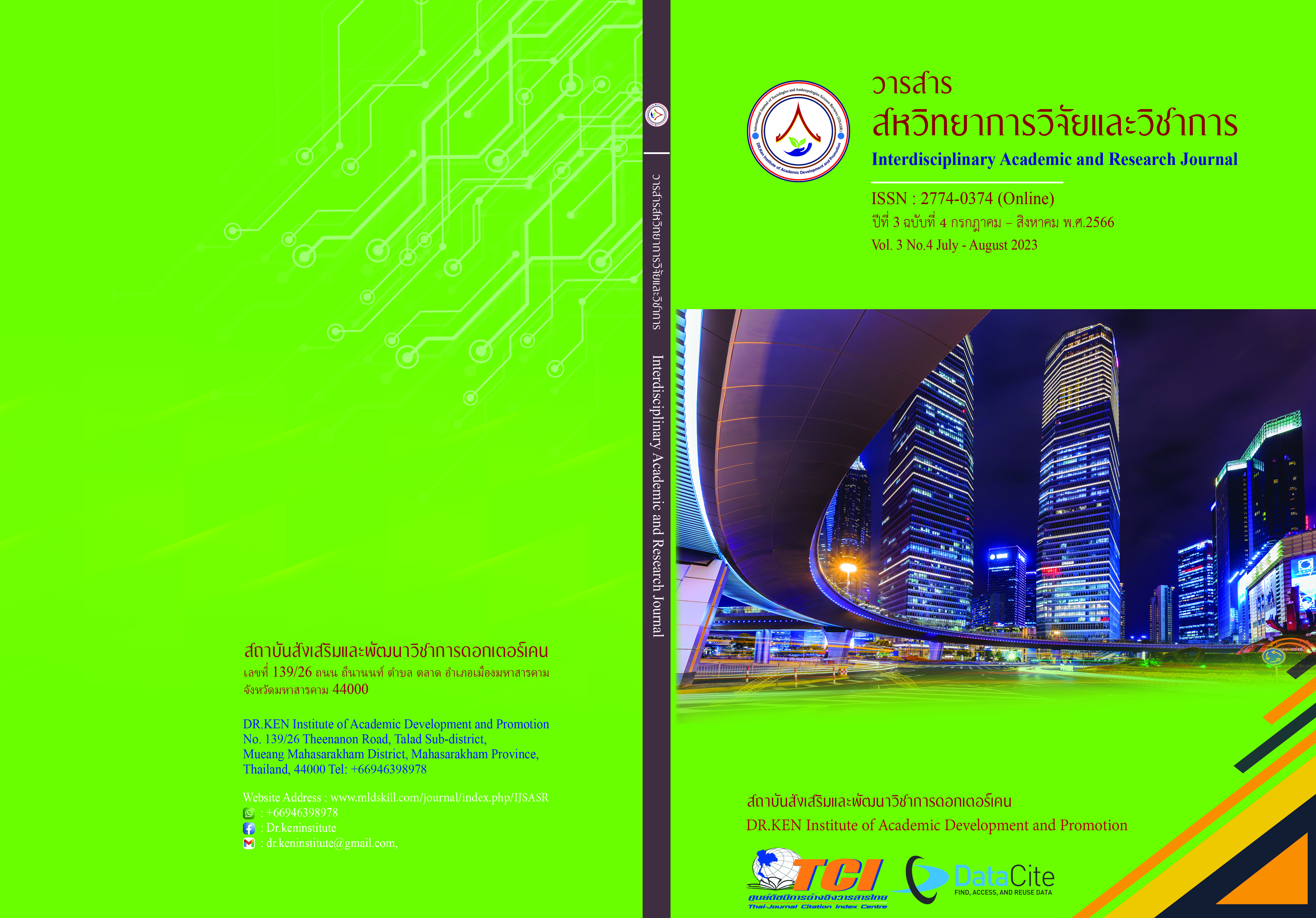The Application of Active Learning Approach to Develop Academic Achievement on an Online Measurement and Evaluation in Elementary Education in MER3006 Course for Undergraduates of Faculty of Education, Ramkhamhaeng University
DOI:
https://doi.org/10.14456/iarj.2023.217Keywords:
Active Learning; , Academic Achievement; , Measurement and EvaluationAbstract
This research was the application of an active learning approach to develop academic achievement on online measurement and evaluation in elementary education in the MER3006 course. The application of the approach for online learning management is an effective method to develop students’ academic achievement during the Covid-19 pandemic. The objectives of this research were to 1) develop learning management based on an active learning approach on online measurement and evaluation in elementary education in MER3006 course for undergraduates of the Faculty of Education Ramkhamhaeng University to have a required efficiency of 80/80. 2) compare students’ academic achievements before and after learning with learning management based on an active learning approach on online measurement and evaluation in elementary education in the MER3006 course for undergraduates of the Faculty of Education Ramkhamhaeng University. 3) student satisfaction with learning management based on an active learning approach on online measurement and evaluation in elementary education in MER3006 course for undergraduates of the Faculty of Education Ramkhamhaeng University. Findings are as follows: (1) The learning management based on an active learning approach on online measurement and evaluation in elementary education satisfied the efficiency standard at 84.64/82.37 in consonance with criteria 80/80. (2) The student’s academic achievements after study with the learning management based on an active learning approach on online measurement and evaluation in elementary education were higher than the student’s academic achievements before the learning. (3) The student satisfaction with the learning management based on an active learning approach on online measurement and evaluation in elementary education in MER3006 was at a high level.
References
เมษ ทรงอาจ. (2558). การพัฒนารูปแบบการเรียนการสอน รายวิชาจิตวิทยาสำหรับครู โดยใช้การสอนแบบมีส่วนร่วมของนิสิตปริญญาตรีมหาวิทยาลัยมหาจุฬาลงกรณราชวิทยาลัย วิทยาเขตขอนแก่น. ขอนแก่น : มหาวิทยาลัยมหาจุฬาลงกรณราชวิทยาลัย วิทยาเขตขอนแก่น
โชติกา ภาษีผล, (2563). การพัฒนาแบบสอบคู่ขนาน : การสร้างและการวิเคราะห์ความเป็นคู่ขนาน. กรุงเทพมหานคร : สำนักพิมพ์จุฬาลงกรณ์มหาวิทยาลัย.
ปราวีณยา สุวรรณณัฐโชติ. (2551). การเรียนเชิงรุก (Active Learning). กรุงเทพฯ: จุฬาลงกรณ์มหาวิทยาลัย.
ปิยะพล ทรงอาจ. (2559). รูปแบบการเรียนการสอน รายวิชาจิตวิทยาสำหรับครู (200 205) โดยใช้การสอนแบบมีส่วนร่วมของนิสิตปริญญาตรีมหาวิทยาลัยมหาจุฬาลงกรณราชวิทยาลัย วิทยาเขตขอนแก่น. ขอนแก่น : มหาวิทยาลัยมหาจุฬาลงกรณราชวิทยาลัย วิทยาเขตขอนแก่น
พงศธร มหาวิจิตร. (2562). การประยุกต์ใช้แนวคิดการเรียนรู้โดยใช้ปรากฏการณ์เป็นฐานร่วมกับการเรียนแบบเชิงรุกในรายวิชาการประถมศึกษา เพื่อเสริมสร้างทักษะการเรียนรู้ในศตวรรษที่ 21. วารสารศึกษาศาสตร์ มหาวิทยาลัยขอนแก่น, 42 (2), 73-90.
วารินท์พร ฟันเฟื่องฟู (2562) การจัดการเรียนรู้ Active Learning ให้สำเร็จ. วารสารวไลยอลงกรณ์ปริทัศน์ (มนุษยศาสตร์และสังคมศาสตร์), 9 (1), 135-145.
Bonwell, C.C., & Eison, J.A.. (1991). Active Learning: Creating Excitement in the Classroom. ERIC Digest. Washington D.C.: ERIC Clearinghouse on Higher Education.
Felder, R., & Brent, R. (1996). Navigating the Bumpy Road to Student-Centered Instruction. Journal of College Teaching. 44(2), 43-47.
Settle, B. (2011). From theories to Queries: Active learning in Practice. In Guyon, G., Cawley, G., Dror, V., Lemaire, A., & Statnikov (Eds.), Workshop and Conference Proceedings, 16, 1-18.
Downloads
Published
How to Cite
Issue
Section
License
Copyright (c) 2023 Sirirat Hitakowit

This work is licensed under a Creative Commons Attribution-NonCommercial-NoDerivatives 4.0 International License.
Copyright on any article in the Interdisciplinary Academic and Research Journal is retained by the author(s) under the under the Creative Commons Attribution-NonCommercial-NoDerivatives 4.0 International License. Permission to use text, content, images, etc. of publication. Any user to read, download, copy, distribute, print, search, or link to the full texts of articles, crawl them for indexing, pass them as data to software, or use them for any other lawful purpose. But do not use it for commercial use or with the intent to benefit any business.
















.png)


